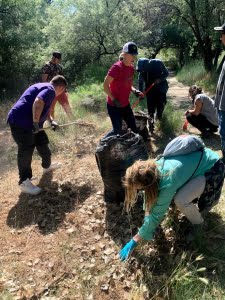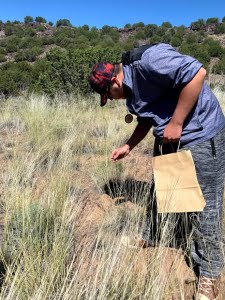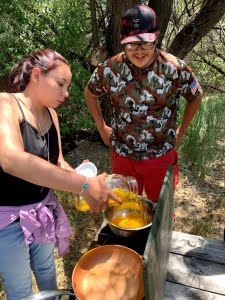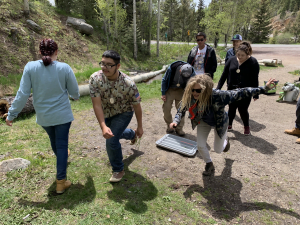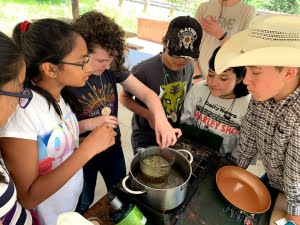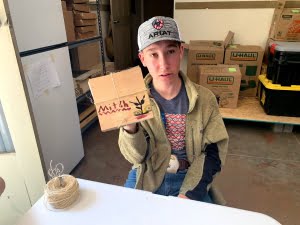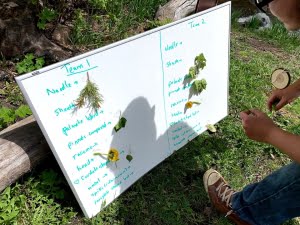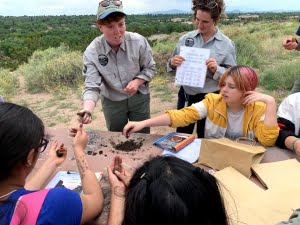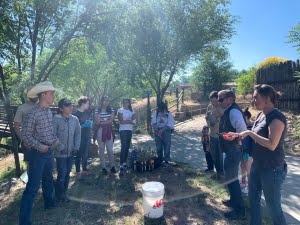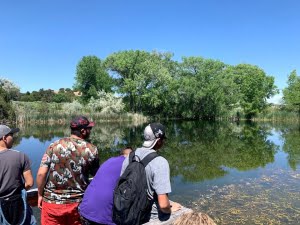
“Who knows the anther?” and other ecological teaching techniques
My plant knowledge is in great part thanks to the jokes, puns, songs, hand motions, and mnemenic devices I learned at the Columbines School of Botanical Studies based in Eugene. I taught many of these memory techniques to the Forest Bound students, in addition to making up new ones (sometimes with student help). For example, one mnemenic from Columbines School is: “You have to be humble with the umbel, since there are so many poisonous plants in the Umbelliferae family.” Umbel is a botanical term for the shape of flowers in the Umbelliferae (aka Apiaceae, or carrot) family, which is appropriate, since they look like little umbrellas. When I would review flower parts with the students I would ask “What are the parts of a stamen called?” and one of them might reply “Filament, and ummmmm…...?” I would then give them a punny hint that I made up: “Come on, one of you has to know the anther to this question!” Eventually one of the students would get the dad-joke pun and answer with a teenage groan or a laugh, “The anther and the filament.” In addition to dumb jokes that make you smarter, we also played several fun plant games, including Forest Bound Jeopardy on the last day, with questions that the students had submitted at the end of each previous day. Jeopardy categories included: “Plants have families too,” “Plants and their allies,” “Parts of a Plant,” and “Mystery.”
A big part of the Forest Bound program is training the future generation of conservation and restoration professionals field techniques that they can put on their resumes and use in future jobs. Besides plant identification, we also trained the students in native seed collection and cleaning through hands-on experience, both in the field and at the IAE seed cleaning studio. The students were taught proper collection of plant specimens by making and painting plant presses, and starting their very own pressed-plant collection. We brought meter quadrats out in the field, and taught vegetation measuring and monitoring. There were also daily “Mentor Chats” where guest speakers from IAE, the BLM, and the USFS provided expert knowledge about seed collection, pollinators, soil science, and GIS. These mentors also offered a glimpse of careers in conservation, as well as opportunities for youth to get involved in science, conservation, and environmental community efforts. Over the last 3 years, IAE Southwest staff have put many hours into adapting lessons from the NM native plant curriculum (From Ponderosa to Prickly Pear, available for purchase here) to create Forest Bound's unique and dynamic curriculum". Students and educators alike have had opportunities to provide feedback that has allowed SW staff to continue to fine tune and make the program the best that it can be
Throughout the week, we covered the edibility and medicinal qualities of various native plants we encountered. We had a “Plant Family Snack” every day, where common edible plants from a family were served while we went over the common family characteristics (carrots for Apiaceae and peanuts for Fabaceae, etc.) On the last day we focused on ethnobotany: we made piñon pine sap salve, and pine nut pancakes with chokecherry jam on top. IAE's Southwest staff had a huge job of not only inventing and adapting many novel lessons and activities to engage these students and all of their senses in caring about plants, and everyone pitched in to make every day a big success - whether the work was co-teaching or working behind the scenes coordinating the many details of the program. It was rewarding to observe how much the students had learned about botany and ecology by the end of the week, but the smiles, laughter, and expressions of “I had so much fun!” were the real reward. I hope to help out with Forest Bound again in the future, and I’d love to start a Forest Bound in Oregon. Stay tuned.
The next 2019 session of Forest Bound will be in the Cibola National Forest outside of Albuquerque New Mexico July 8-12 and led by Sandia High School Biology teacher Jason Roback. Find more information on our website here. Also check out this article about Forest Bound that the Santa Fe Reporter published:
https://www.sfreporter.com/news/2019/05/29/curing-plant-blindness/
Tags:
Restoration
Research
Education
Contact
Main Office:
4950 SW Hout Street
Corvallis, OR 97333-9598
541-753-3099
info@appliedeco.org
Southwest Office:
1202 Parkway Dr. Suite B
Santa Fe, NM 87507
(505) 490-4910
swprogram@appliedeco.org
© 2025 Institute for Applied Ecology | Privacy Policy
